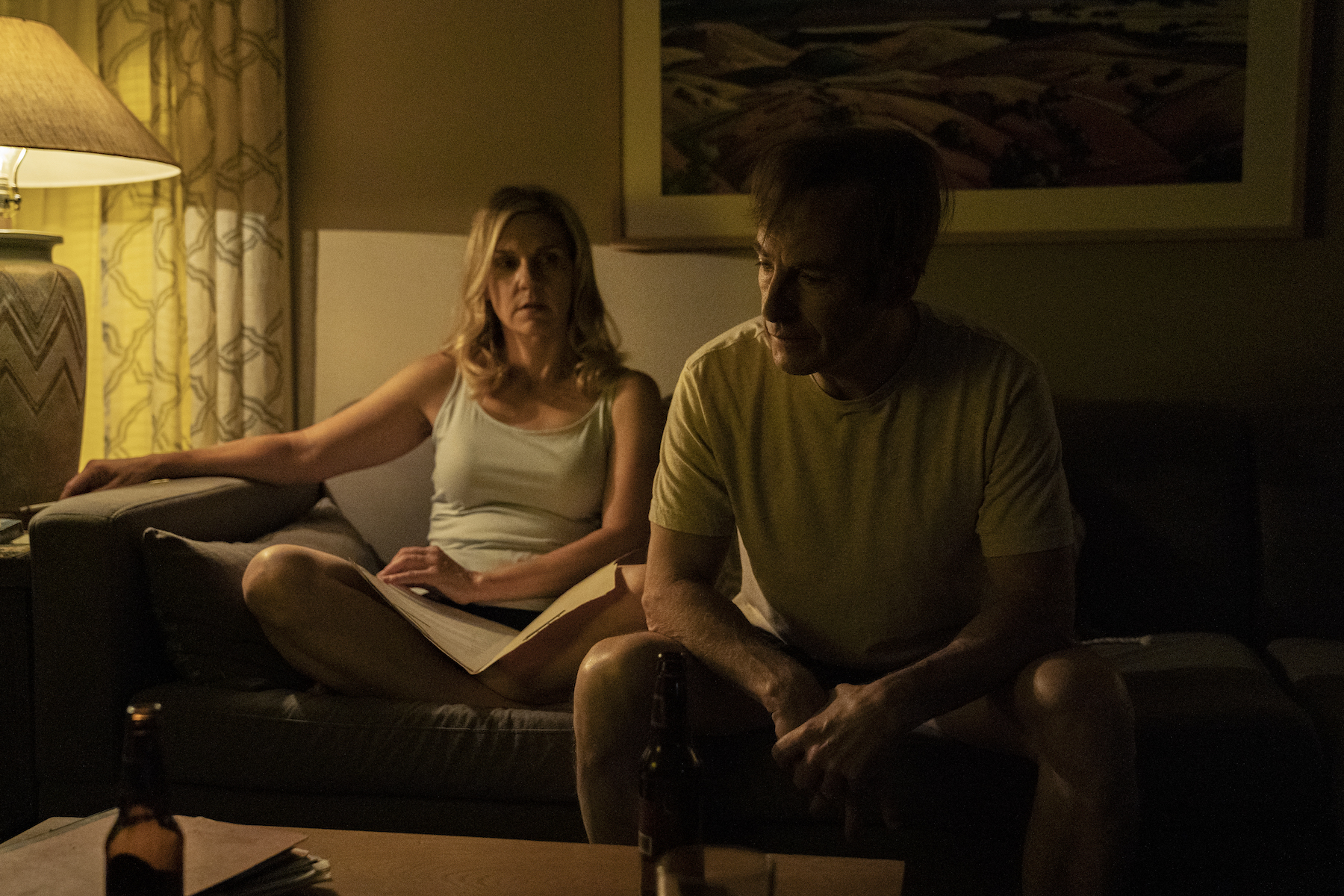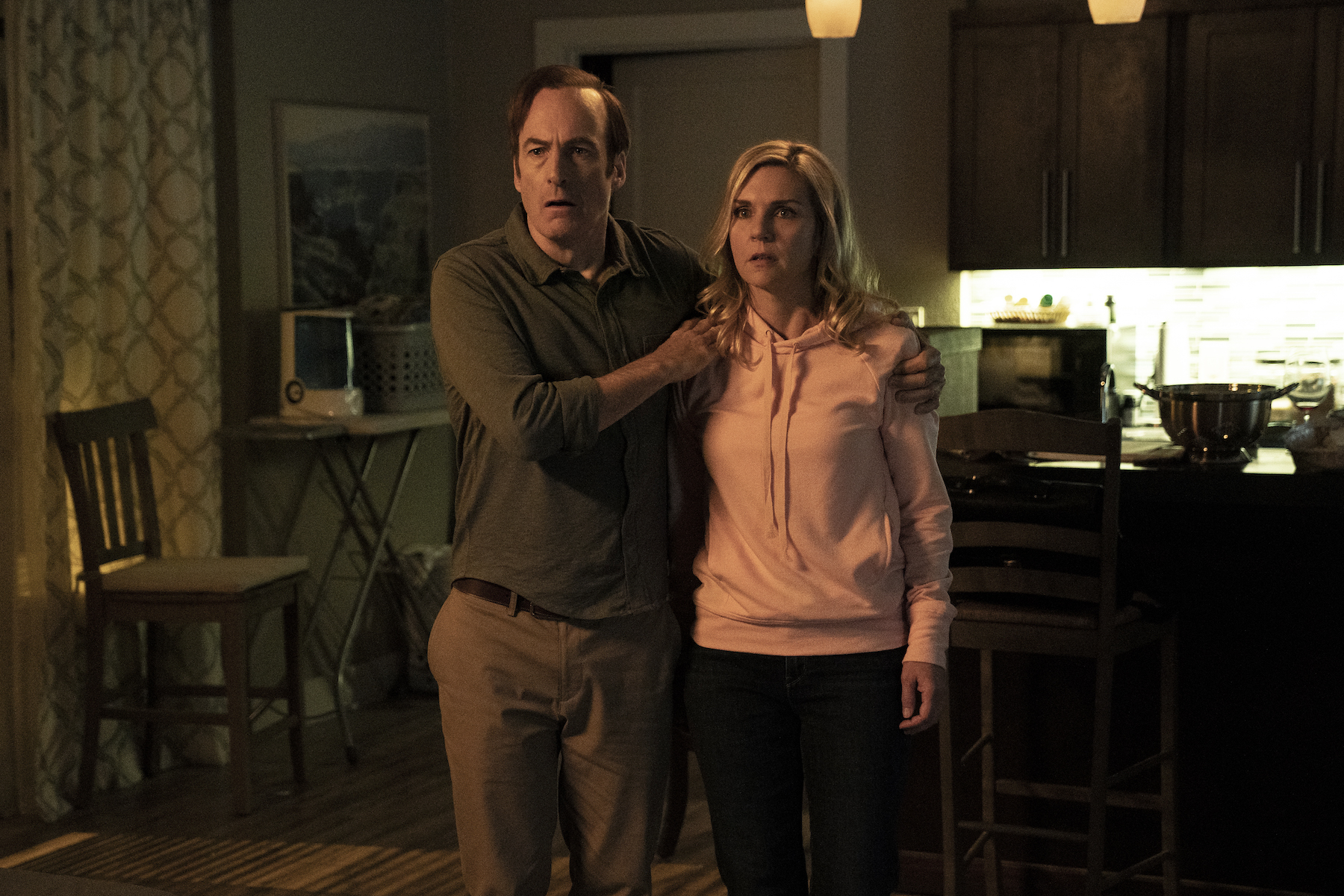With the final round of 2022 Emmy voting on the horizon, IndieWire TV writers Ben Travers and Steve Greene decided the time was right for a Double Take discussion on — and a call to arms for — the beloved, long-running AMC drama “Better Call Saul.” This is that discussion.
Ben Travers: A great philosopher once said, “Ain’t nuthin’ over ’til it’s over,” and for the great AMC cable drama “Better Call Saul,” the final bell won’t ring until 2023 — at least, when it comes to the Emmys. Vince Gilligan and Peter Gould’s acclaimed prequel to “Breaking Bad” has only three episodes left before it’s lights out, with the series finale set to air Monday, August 15. But splitting its final season into two parts — the first of which wrapped in May — means Season 6a is eligible for this year’s Emmys and Season 6b will be eligible for next year’s awards.
Its predecessor’s closing hours shared a similar rollout, albeit with a much longer wait in between. “Breaking Bad” Season 5a ran through late summer 2012 before Season 5b picked up in August 2013, resulting in 13 nominations (and three wins) at the 2013 Emmys (for 5a) and 16 nominations (and six wins) at the 2014 Emmys (for 5b). Despite the nine-month wait between its initial airing and Emmy voting, the final half-season of “Breaking Bad” earned more nominations and more wins than any previous season, even topping major competitors like “True Detective” (Season 1), “Game of Thrones,” and the first half of the “Mad Men” goodbye.
So, Stephen, why the urgency? Why have we convened our two-person emergency campaign committee to insist voters get behind “Better Call Saul” now, rather than sit back and trust the flowers are coming for Season 6b? Why, beyond the subjective merit of the submitted episodes (which, it must be said, is of the highest regard) does it feel like gold will be bestowed this September or not at all?
Among other specific trends — like the series’ decline in yearly nominations since peaking with nine in 2019, compared to “Breaking Bad” rising or breaking even while winning at least once every year — I’d first cite that the TV world has changed drastically since “Breaking Bad” was honored. The Emmys have, too. In 2014, “House of Cards” was nominated for its second season. Streaming had yet to place its stranglehold on TV, the Emmys, and Hollywood at large. Premium and basic cable were still the (relatively) new kids on the block, boxing out broadcast before they, too, started to be boxed out by Netflix, Hulu, Disney+, and more. When “Breaking Bad” ended, AMC’s clout was at its peak. “Mad Men” had already scored four Drama wins. “The Walking Dead” was a ratings juggernaut. A little show called “Halt and Catch Fire” was set to pick up the mantle as AMC’s next great drama.
But ever since “Halt” never sparked with Emmy voters (or the public at large), the TV Academy’s attention has drifted — or, more accurately, it’s been overwhelmed. In 2013, when “Breaking Bad” last aired, 349 TV shows were released. Just two years later, when “Better Call Saul” premiered, the total jumped to 422 —and kept climbing. In 2021, there were 559 shows. At the same time, cords were cut and streaming ascended. People don’t watch TV the way they used to, and there’s also more TV than ever.
That’s made things hard on cable dramas like “Better Call Saul,” but even I didn’t realize how hard until I reviewed the series’ Emmy stats this morning. While a consistent presence on nominations’ day, “Better Call Saul” has never won an Emmy. Let me say that again, because it’s truly shocking: Despite 118 categories, five years of eligibility, and multiple nominations in every eligible year, “Better Call Saul” has gone 0-39 at the Emmys.
It’s safe to say “Better Call Saul” is long overdue, which is reason enough for our rallying cry, but before I get too carried away, Stephen, help me out. You’ve been reviewing every episode of this series for years now. You’ve been in the trenches, week in and week out. You’re looking at the same Emmy figures as I am. What are the categories where “Better Call Saul” most demands recognition, and do you agree the odds of being recognized this year are better than a year from now?
Steve Greene: Well, Benjamin, let’s look at where this show has been overlooked in the past. For years, it was a given that “Better Call Saul” would take at least one slot in the Supporting Actor in a Drama category, and the recognition always went to Jonathan Banks and/or Giancarlo Esposito, two people reprising iconic roles. But there was no room for the iconic newcomer, Michael McKean, whose lone nomination came in the Guest Actor category. (Here’s my turn at reemphasizing something: Not only was that McKean’s only nomination for this show — he should have won the dang category three years running — it’s his only Emmy nom… ever? Unacceptable. I know the Academy’s list of egregious oversights is reaching the length of a few “Pacific Reporter volumes” these days, but let McKean’s slight be on the first few pages, at least.)

“Better Call Saul”
Greg Lewis/AMC/Sony Pictures Television
Both Banks and Esposito are absent from this year’s list, which is partly due to the “Succession”/”Severance”/Squid Game” wave taking a giant chunk of the category for themselves. But it’s also an indication that this is a show that has been a victim of its own success. Not only do Esposito and Banks continue to turn in meticulous, dazzling work, you could easily make an airtight case that the inimitable Tony Dalton deserved serious attention for Season 6a (to say nothing of Michael Mando, who would have been a worthy Guest Actor contender). With so many worthy options, there wasn’t a clear choice to knock off Billy Crudup for that last 2022 spot. The fact that none of them made the final cut does mean that Bob Odenkirk and Rhea Seehorn can get the full acting nominee push over the coming weeks. The show’s recent string of episodes is a week-by-week showcase, something that none of their competition have at the moment.
There’s also an argument to be made for the show’s other categories, where “Better Call Saul” is offering something that the presumed favorites aren’t. Take Sound Editing, where it’s up against five shows that have aliens and monsters. For a show set in mid-2000s Albuquerque to break through a genre-heavy clutter like that, the Nacho stakeout scenes in their submission episode stand out in a way that a space-heavy soup might not. Same goes for music supervisor Thomas Golubić, who has consistently foregone easy nostalgia bait for a true atmospheric complement to this season’s hop across multiple continents. Had “Succession” not snaked almost half the Directing category, Michael Morris’ work on the season premiere or Gilligan’s on the following episode would have been a shoo-in for one of those extra slots. But if there’s any episode of the show that could convince an outsider or a newcomer that “Better Call Saul” is worthy of a writing award, Tom Schnauz’s nominated midseason finale is the one.
I’m guessing, though, that Odenkirk and Seehorn are going to have to be the rising tides that lift all those other boats. We clearly both think they’re deserving, but do you think there are enough Academy voters who haven’t seen all six seasons but will still vote for it to put “Better Call Saul” over the top?
Ben: Ah, the million-dollar question: What are Emmy voters actually watching?
“Better Call Saul’s” consistency at the Emmys — earning seven-to-nine nominations each year — is an indication both of the show’s promise and its impediments. Getting an Outstanding Drama Series nod six years in a row, with two ineligible years in between and a steady fluctuation of competitors, is quite a feat. Every member of the TV Academy votes in the Outstanding Program categories, which means there’s a strong base of “Better Call Saul” viewers who like what they see, year in and year out.
But that group does not appear to be expanding. The show’s 46 nominations have come in only 12 categories. Most of them repeat from year to year, like Drama Series, Lead Actor, Writing, and Supporting Actor, with only minor and occasional moves into new areas. The show’s only previously-not-nominated category this year is Supporting Actress, and the lack of a Supporting Actor contender in 2022, as you noted Steve, seems to indicate the shift is more about the math of a given year than a sudden influx of Rhea Seehorn fans. The actors got boxed out, while Seehorn (finally) found her path in.
Now, to answer your question directly — can Bob Odenkirk and Rhea Seehorn actually win — here’s where I hope the math helps out. Voting for the winners opens August 12. “Better Call Saul” airs its series finale three days later. There are few campaign materials more convincing than exciting new episodes airing as people cast their ballots, and the ending of this series will certainly be exciting. And that excitement transcends what happens onscreen. There’s fan excitement, critical excitement, and even industry excitement (AMC still knows how to campaign) over a landmark series reaching its conclusion. There’s nostalgia for folks who loved “Breaking Bad” but only sporadically kept up with “Better Call Saul” (and those viewers should be activated by the impending returns of Bryan Cranston and Aaron Paul), and there’s binge-viewers who are only catching up on the full series now, timed to its ending. The fervor around the series should be peaking, just as voters are deciding who to honor.
Given these factors — plus the show’s continued support from the TV Academy’s acting body — I have to believe Bob Odenkirk and Rhea Seehorn have more than a fighting chance to take home their (and their series’) first Emmys. Supporting Actress is such a consistent mystery that Julia Garner managed to shock experts twice: first by topping every nominee from the final season of “Game of Thrones,” then by winning again the next year, absent any vote-splitting explanations. Garner is again nominated this year, and for the final season of her breakout role in “Ozark,” but there’s a reasonable path to victory for every nominee. Seehorn’s is simple: She’s the best. She’s arguably the most beloved performer on the series, above “Breaking Bad” veterans like Esposito and Banks, not to mention the titular lead himself, Bob Odenkirk.

“Better Call Saul”
Greg Lewis/AMC/Sony Pictures Television
But Odenkirk has a decent shot, too. If the “Succession” leads split the vote among the dominant HBO series’ die-hard Academy contingent (some folks’ favorites are set in stone), that leaves “Squid Game’s” Lee Jung-jae as the leader in the clubhouse. To be perfectly honest, he’s my bet at the moment (purely as a prognosticator), but that’s where the well-timed swell of support could lift Odenkirk to victory. “Breaking Bad” won its first Drama Series Emmy as its last episodes were airing. While Drama Series may be out of reach, “Better Call Saul” certainly deserves a comparable boost.
From the outside looking in, it feels like such a surge is possible — and much more likely to happen now than a year from now, when the TV Academy’s attention either drifts to the shiny new show or gets overwhelmed by hundreds of fresh competitors — but Steve, as our “BCS” expert, what are your thoughts on the elusive momentum “Better Call Saul” has yet to catch? What about the show has kept it from reaching the same heights as its predecessor, both at the Emmys and in the culture at large? The reviews are incredibly strong. The fandom seems quite pleased. The release model is similar, airing first on AMC before eventually landing on Netflix (and, now, AMC+). Yet the lead-up to this ending feels far removed from the intense, all-consuming build-up to “Breaking Bad’s.” Is it simply a “lightning doesn’t strike twice” scenario? Is “too much TV” to blame? And could the added benefit of seeing the full picture lead to a reappraisal — if not now, then next year?
SG: Part of me wonders if “Game of Thrones” just fundamentally broke the Emmys in some way that hasn’t quite healed, at least when it comes to the Drama category. It set an expectation of spectacle, one that the show itself spent multiple years chasing. The other two shows to win in its wake may not have explosions or giant monsters (depending on your views on Logan Roy or Margaret Thatcher), but they’re marked by decadence and opulence. Add in “The Handmaid’s Tale,” which had to destroy the entire country (and Fenway Park) in order to succeed creatively, and there’s a precedent where substance has to come paired with size.
The beauty of “Better Call Saul” is that it’s resisted a lot of those instincts. As noted earlier, the show has a global scope, but it’s built by late-night conversations, not dazzling helicopter shots. The same is true on the performance side. Odenkirk hasn’t gotten his “I am the danger” moment, because he doesn’t need one. The Jimmy-to-Saul pipeline is more gradual and insidious than Mr. Chips-to-Scarface. It’s a character capable of his own menace and misdeeds, but it comes with a more internal struggle against forces way beyond his control.
Without sounding too callous, I think Season 6a ended with the closest thing this show can get to those pre-set expectations. “Better Call Saul” has always toyed with its own ticking time bomb tension, but that nominated midseason finale culminates in a shocking moment of violence that felt both inevitable for the show and completely earned. It also happens to be the form of stakes-raising that a wide viewing audience associates with “good drama,” even on shows that haven’t done a fraction of the character work to make a shocking moment like that mean something.
There are plenty of moving parts in that sequence, including the aforementioned Schnauz’s writing. What really sells the gravity of the moment and everything that led to it is Odenkirk and Seehorn, who look as viscerally shaken as any two fictional people have ever been on screen. The Academy tends to go for capital-a Acting. Even a more muted performance like Matthew Rhys’ likely benefited from his character having to become multiple people as much as having last-season goodwill. “Better Call Saul” now has the centerpiece that can grab those playing catch-up and validate everyone who for years has been saluting the work that both of them have done on other parts of the emotional spectrum.
Regardless of the reason, as Ben mentioned, the pieces are in place now for “Better Call Saul” to get the recognition that it’s deserved for almost a decade. Sure, there’ll be next year, but to quote a morally suspect attorney quoting a morally suspect director (quoting himself), “It’s showtime, folks!”
“Better Call Saul” airs Mondays at 9 p.m. ET on AMC and is available on AMC+.


